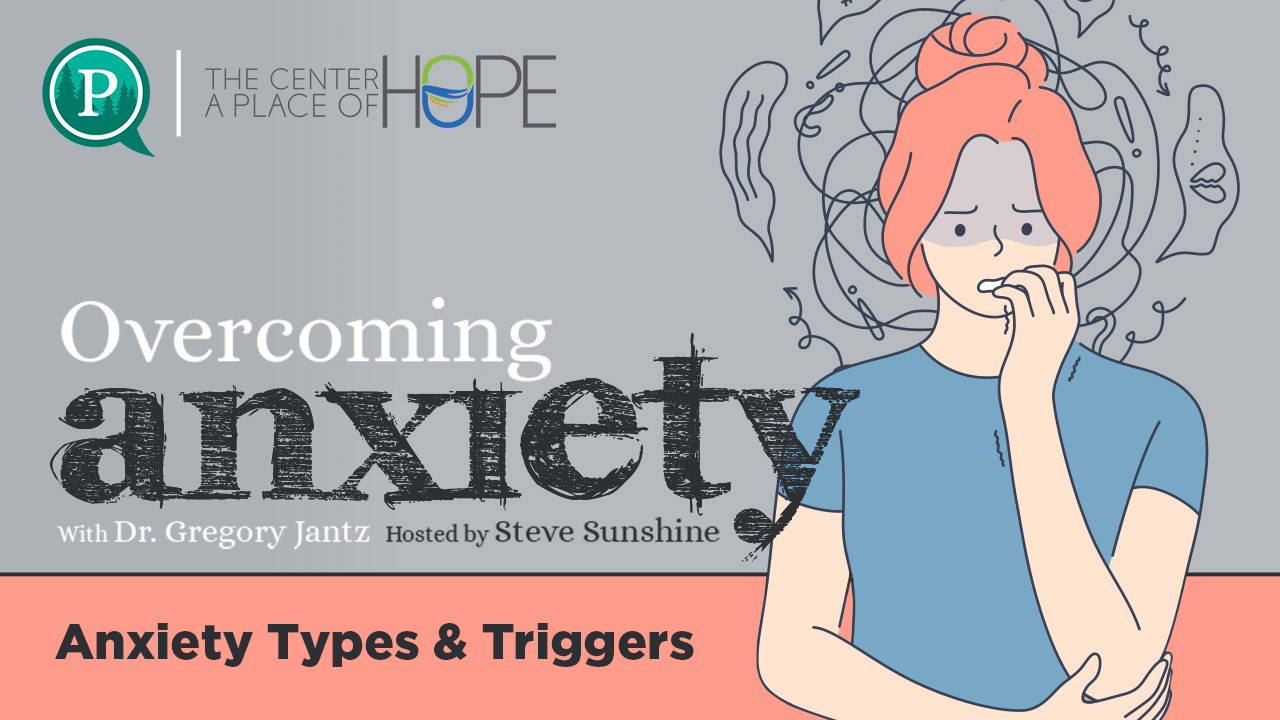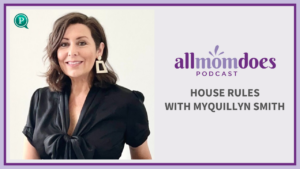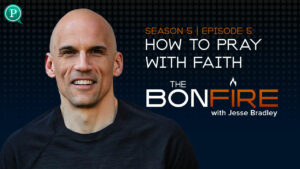Depression used to the be the top mental health illness, but that has been surpassed by anxiety. Steve Sunshine hosts Dr. Gregory Jantz on episode 1 of Overcoming Anxiety to identify anxiety types and triggers.
Transcription:
Dr. Gregory Jantz: Is depression or anxiety gotten so disabling that I really do need this, some professional intervention, and what are my options? Maybe today’s the day I decided I’m going to get more information. Yeah. Obviously, I’ve written 40 books and I have a great book on anxiety, but that doesn’t answer everything. Okay? Because there’s times where we need help putting things into practice.
Steve Sunshine: We’ve heard a lot over the years about depression, but anxiety is actually even more prevalent. Hi, and welcome to Overcoming Anxiety, a special five-part podcast from Purposely. I’m Steve Sunshine, and I’ll be talking with Dr. Greg Jantz, founder of The Center – A Place of Hope, and author of The Anxiety Reset.
Now, when we say anxiety, what are we talking about? In this episode, we’re going to talk about the different types of anxiety and what triggers them. Now, here’s my conversation with Dr. Jantz.
What are some of the causes and catalysts, I think you call it in the book, and what can you do about them?
Dr. Gregory Jantz: My goodness, when we talk about anxiety, a lot of things come to our mind. And right now, you know, we look at anxiety on a continuum, Steve. There’s the mild and you know, we’re human beings, we have anxious days, but then as it progresses over time and maybe anxiety gets worse and worse. There are different types, and one we’re seeing a lot of is that of social anxiety. And this is where, cause all the rules changed. We had a pandemic. Now we go out and we wonder, do I shake your hand? I certainly don’t hug you. All the rules are different. And so, anxiety levels actually at our all-time highs. Used to be depression was number one as far as mental health issues. Right now, it is anxiety.
And you asked the question about triggers. There can be a lot of things right now that are really difficult for us, and that we may go to certain see certain people that we don’t know if they’re safe or not. And the question that most people experience is, well, who is safe, what is safe? What’s okay? So, there’s a lot of what if’s producing a lot of anxiety.
Steve Sunshine: So, what do you, what do you think has changed, or has anything changed in, in what you find yourself having to say to people, you know, since the pandemic started, as opposed to during the, what we used to call the the precedented times, before the unprecedent times?
Dr. Gregory Jantz: Yeah. Well, you know, pandemic has produced for us, and we really, truly are, and we’re seeing the numbers right now in a epidemic, a mental health epidemic. And that means there’s a lot of people struggling right now. The three big struggles, anxiety, depression, and addiction. And so all we’ve seen is all the numbers increase. So, for some, who may be, maybe were already struggling with some depression, maybe you were already struggling that had some anxiety. This so-called, this pandemic came along, everything changed, and it was the tipping point. It was the perfect storm, so to speak, and that perfect storm led you down a road of chronic stress, chronic anxiety. So, it’s a different view now and everybody, we’re still on a real hyper vigilant state. Everybody’s easily concerned or triggered. Everybody’s hypervigilant. People are wondering, well, what’s true. I don’t know what to believe.
Steve Sunshine: Really takes away a lot of the kind of foundational ways of looking at things and can throw pretty much anybody off, off balance and making it feel like, you know, what’s going on, which is kind of scary in a lot of ways.
So it revs people up. What about outside of something like the pandemic, what are some common stressors for people?
Dr. Gregory Jantz: Well, amazingly and unfortunately, one of the triggers it’d be relationships. See the pandemic has divided people, unfortunately, unnecessarily. So we’ve got those with different points of view, both sides and sometimes extreme. And so we’ve seen division in families. We’ve seen division in the workplace… Who was once my friend is now not my friend. And you know, we need to come together, and my, my beliefs say let’s work together and love one another, but that’s been a big challenge. So, people are triggered by if somebody doesn’t believe what I believe they’re wrong. And we’ve gotta be really careful about that.
Steve Sunshine: Absolutely. Now there’s more than one kind of anxiety. I know, I think you say they, they can be physical or psychological or lifestyle related.
Dr. Gregory Jantz: Oh, sure. You know, anxiety can be created in different forms. There is certainly for those, let’s say during the pandemic, you did the old virtual work from home and maybe kids were at home trying to do school. Well, that didn’t work really well. In year 2020, we had the highest academic failure on record, so that didn’t work. So that created more stress. Those oftentimes, we kind of over digitized our brain, if you will. Too much screen time and we didn’t have relationships, so we didn’t have real relationships.
And so now there’s a push to push, kind of push people back into. Major corporations are saying, hey, we’re all heading back in. And so, for some that’s, that’s a major stress point that’s so there’s the workplace anxiety. There’s the anxiety around, what’s going to happen here in the future? This, this world seems upside down. I don’t know what’s going to happen. So, there’s that futuristic pandemic, anxiety that’s saying, well, what’s going to happen. I’m afraid. So where are we where we put our anchor right now is going to be really important because there are some unknowns. There are some things that are outside of our control.
Steve Sunshine: Are some people more predisposed to anxiety than others just naturally?
Dr. Gregory Jantz: You know, sometimes we may, maybe we grew up in a home where there was a lot of fear. It’s just a fearful environment. You were, maybe it was intimidation. Maybe we’re afraid. Maybe it was discipline or punishment, but you, you grew up in a home, or potentially in a church where maybe there was a lot of guilt. And so, you found yourself just kind of learning how to be afraid. And so that sets you up. Now we also know certain medical conditions, if I have a thyroid issue, I have low blood sugar hypoglycemia, certain physical conditions can promote a physiological response of anxiety.
Steve Sunshine: So, what do you do about that?
Dr. Gregory Jantz: Well, we’ve got to look at the whole person. If I’m going to really work on rebuilding my wellbeing and addressing anxiety, I’ve got to look at spiritually what potentially needs to be renewed or get back on track. Okay? And that’s a big area that can be looked at. We also want to look, okay,
physically. If I stopped doing all the good things, if I stopped exercise, have I stopped drinking my water? You know, some of the basics when we are under a lot of anxiety, that’s chronic, we stop doing the good things. What about my nutition? Oh, yeah, I know there is the pandemic weight gain and there’s, I’m not happy with myself.
Steve Sunshine: Everybody’s own Covid 19.
Dr. Gregory Jantz: Exactly. Or maybe it’s COVID 25, you know?
Steve Sunshine: Yeah.
Dr. Gregory Jantz: So what’s going on, you know, the big question is, well, what’s going in my mouth? What do I need to do to change? And, and begin. Give yourself, okay, this next month, I’m really going to work on this. I am going to begin to take these baby steps to start to rebuild and get myself going in a good direction.
Is depression or anxiety gotten so disabling that I really do need to seek some professional intervention? Do I need to do that? And what are my options? Do I need to, maybe today’s the day I decide I’m going to get more information. Now, obviously I’ve written 40 books and I have a great book on anxiety, but that doesn’t answer everything. Okay? Because there’s times where we need help putting things into practice.
Steve Sunshine: And then that’s, when you go and get, get some help from, from somebody who’s been training, like Dr. Jantz, for example. We’ve got the Bible that says things like, be anxious over nothing. If you find yourself anxious over something how do you, you know, why does that happen? How do we, how do we deal with that from a, just from a Christian standpoint?
Dr. Gregory Jantz: And there’s a lot of scriptures from just to deal with fear and you go, my goodness, I have all these fears. What’s wrong with me. I must not be a very good Christian or you take the leap in your thinking, going, God must not really love me. There’s something terribly wrong with me. Okay. That’s what happens to your thinking. And we can get really shame-based like fact if something’s wrong with me, Let’s just say it, anxiety can be a part of being a human being. We just can’t stay parked in it. There are things that happen every day that are out of our control, and at first our response may be an anxious moment or two, but we can’t live in that anxiety because anxiety over time, it takes something out of our ability to make good decisions. You know, God designed our brain and the prefrontal cortex that touch your for your, you know, the front of your brain there, forehead, that’s the prefrontal cortex.
That’s where you make good decisions. And have you ever noticed when you feel anxious, you can’t really make a decision. So, go back. Now we do want to go back to God’s truth and there is a renewing of the mind that’s so important. But, and we always can learn in our anxiety. Always. We’re going to learn things and ask God, Lord, God, give me the wisdom to learn what I need to learn here and move through this anxiety. You don’t avoid it. You move through it.
Steve Sunshine: Yeah. That’s, that’s really great. Do you know what holds people back? You know, the, the, the whole somebody saying you know, there there’s that expression, let go and let God. And somebody comes to you and say, I try to let go, but it won’t leave my hand. I always, I always seem to have a grasp. What, what do you say to somebody like that?
Dr. Gregory Jantz: There is a letting go, and I’m going to say it’s a practicing because letting go doesn’t mean I’m going to be out of control, but that’s what it feels like. And probably I need to have probably two or three key people in my life that really believe in me, that can speak truth in my life.
Be careful, you don’t have too many voices. People go down a lot of rabbit trails right now. You know, and they don’t realize you ask somebody, well, how long were you online? And you know, they it’s been six hours and they thought it was a half hour because the more and more that you overcook or overanalyze, the more anxiety you’re going to create.
Give God some equal time. His word is powerful, but don’t expect everything to suddenly be okay. Give it some time. That’s why I say, hey, let’s have a 30 day plan here.
Steve Sunshine: Special thanks to Dr. Greg Jantz, of The Center – A Place of Hope for joining us for this series. Next week, we’ll be talking about the power of gratitude, so make sure to follow this podcast and get the next episode of Overcoming Anxiety.
Thank you for tuning in, and don’t forget to share this podcast with a friend. This podcast is part of Purposely, a podcast network designed with practical podcasts to help you find, and live in, God’s purpose for your life. Find more amazing podcasts, just like this at onpurposely.com.








